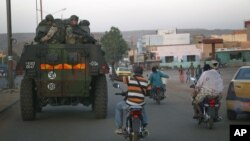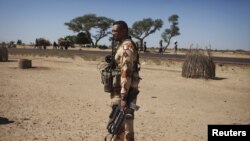ABUJA, NIGERIA —
The World Bank says it is accelerating its support for Mali's government as the country’s economy slows. Surrounded by impoverished countries, the bank worries that a prolonged conflict in Mali could damage the region’s already fragile economy.
Mali is one of the poorest countries in the world, in the middle of one of the poorest regions in the world. Both the World Bank and the International Monetary Fund rank Mali and six of its seven neighbors among the world’s 50 poorest countries.
The crisis in Mali that has already drawn troops from France and Nigeria is making things worse economically for Mali and its trading partners.
“Mali’s a landlocked country and a lot of the economic activity is imports, based on either the truck industry in neighboring countries or the port. The Port of Dakar has a lot of activity linked to Mali so a slow down in port in Mali will affect a slow down in some of these activities,” said World Bank Vice President for Africa Mouktar Diop in the Nigerian capital Tuesday.
Mali’s economic growth has already slowed considerably, he says, and its neighbors like Ivory Coast and Senegal are losing business.
“You have, for instance, a few products linked to low-income consumption which was produced in neighboring countries and exported in[to] Mali. So a slow down of that sector will affect those producers,” said Diop.
Diop says the World Bank is working to speed up aid programs that were halted briefly last year after a coup left the bank without a known government to support. He says the bank is also working on a plan to lend direct support to Mali’s national budget.
The real economic disaster, he says - the one that could make West Africa’s population even poorer - will come only if the conflict drags on, increasing the number of displaced people and leaving the 350,000 already displaced dependent on aid to survive.
Mali's government lost control of the north last April, after renegade soldiers overthrew the president. Tuareg separatists initially swept into northern cities and proclaimed an independent state, but were soon pushed aside by Islamist militant groups with links to al-Qaida and the goal of imposing a strict form of Sharia.
Along with France and Nigeria, Burkina Faso, Niger, Senegal and Togo are also planning to send troops to Mali. Rebels say French intervention has initiated a war that will be longer and more brutal than Afghanistan or Somalia.
Mali is one of the poorest countries in the world, in the middle of one of the poorest regions in the world. Both the World Bank and the International Monetary Fund rank Mali and six of its seven neighbors among the world’s 50 poorest countries.
The crisis in Mali that has already drawn troops from France and Nigeria is making things worse economically for Mali and its trading partners.
“Mali’s a landlocked country and a lot of the economic activity is imports, based on either the truck industry in neighboring countries or the port. The Port of Dakar has a lot of activity linked to Mali so a slow down in port in Mali will affect a slow down in some of these activities,” said World Bank Vice President for Africa Mouktar Diop in the Nigerian capital Tuesday.
Mali’s economic growth has already slowed considerably, he says, and its neighbors like Ivory Coast and Senegal are losing business.
“You have, for instance, a few products linked to low-income consumption which was produced in neighboring countries and exported in[to] Mali. So a slow down of that sector will affect those producers,” said Diop.
Diop says the World Bank is working to speed up aid programs that were halted briefly last year after a coup left the bank without a known government to support. He says the bank is also working on a plan to lend direct support to Mali’s national budget.
The real economic disaster, he says - the one that could make West Africa’s population even poorer - will come only if the conflict drags on, increasing the number of displaced people and leaving the 350,000 already displaced dependent on aid to survive.
Mali's government lost control of the north last April, after renegade soldiers overthrew the president. Tuareg separatists initially swept into northern cities and proclaimed an independent state, but were soon pushed aside by Islamist militant groups with links to al-Qaida and the goal of imposing a strict form of Sharia.
Along with France and Nigeria, Burkina Faso, Niger, Senegal and Togo are also planning to send troops to Mali. Rebels say French intervention has initiated a war that will be longer and more brutal than Afghanistan or Somalia.






